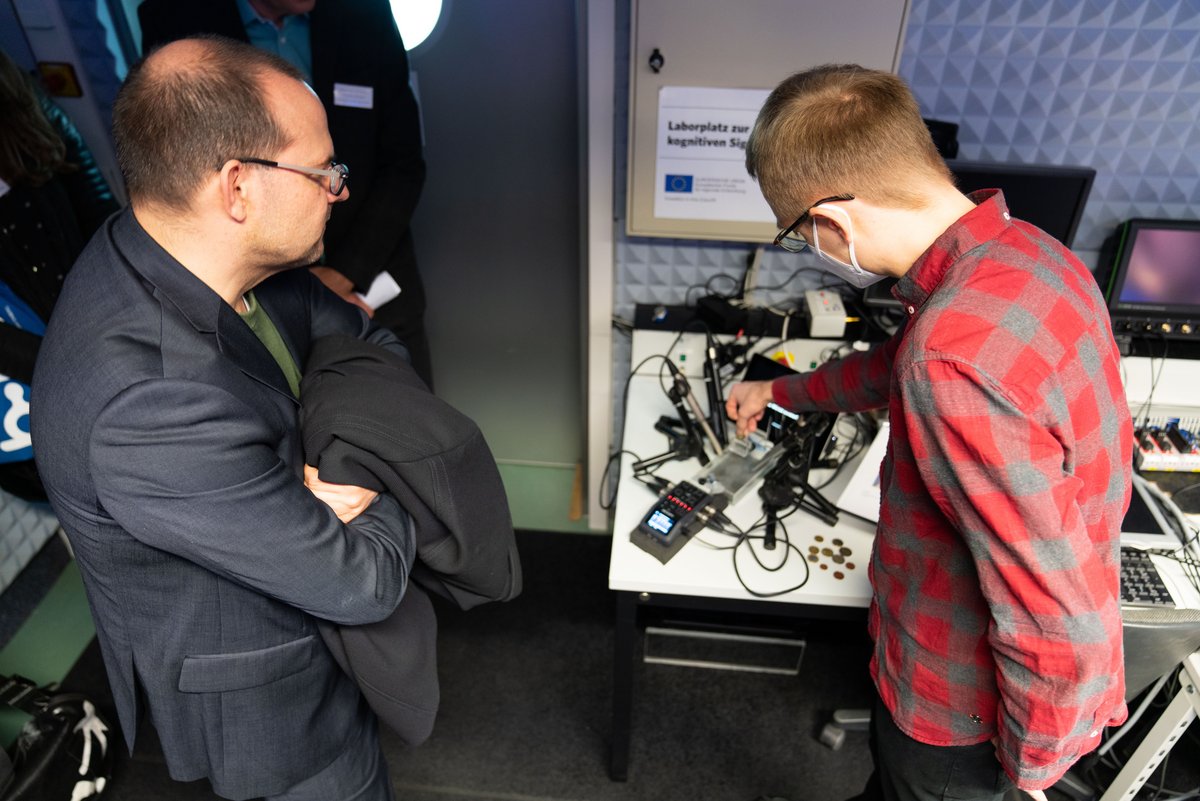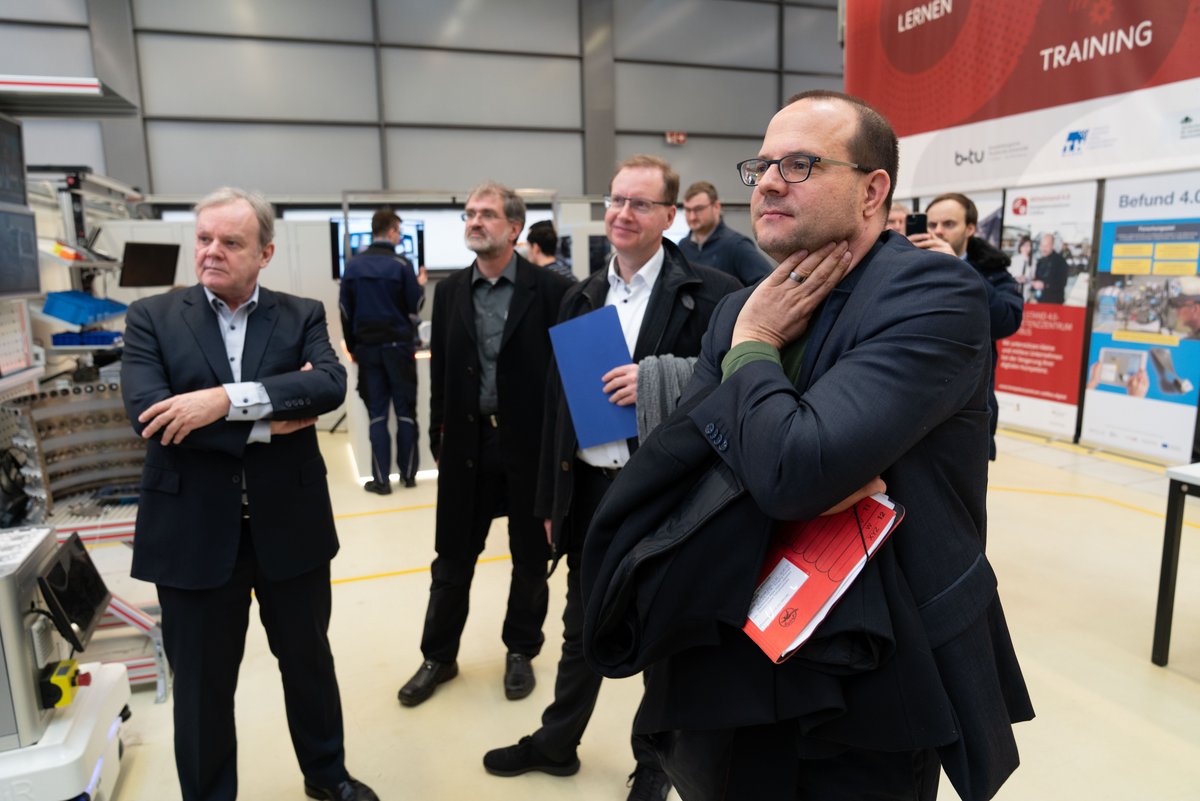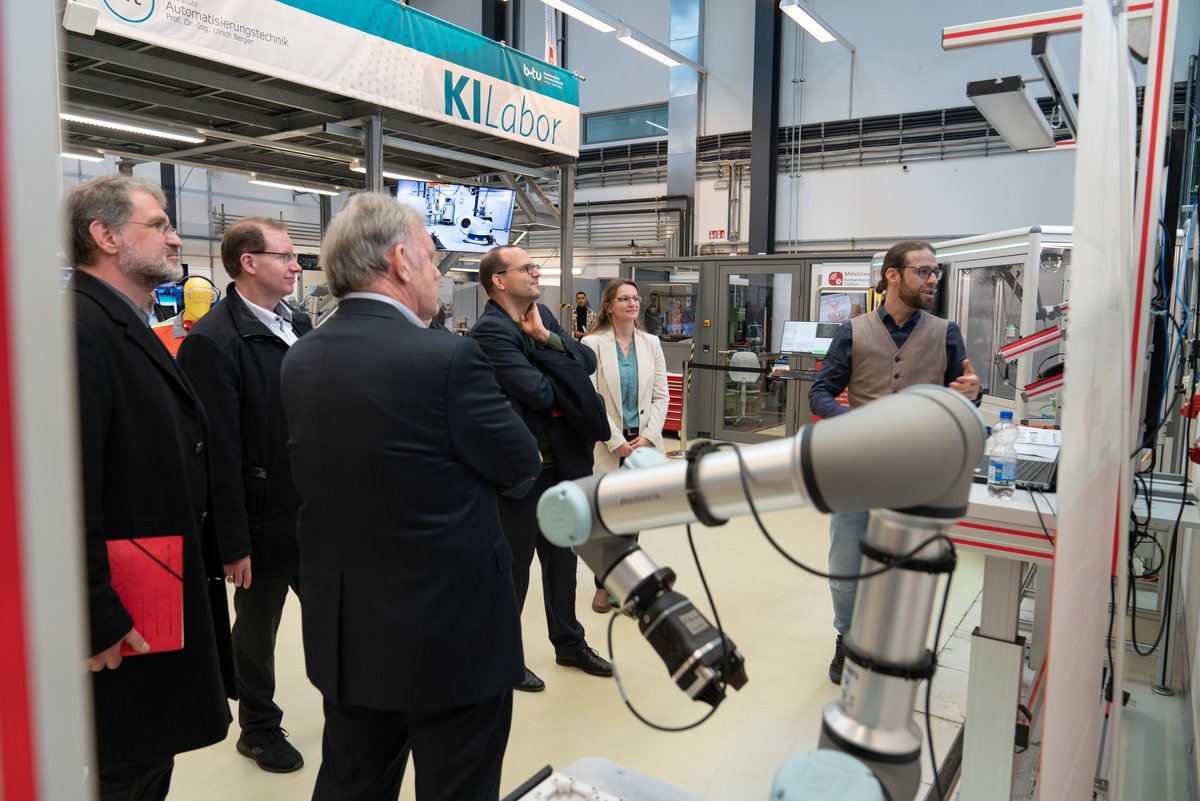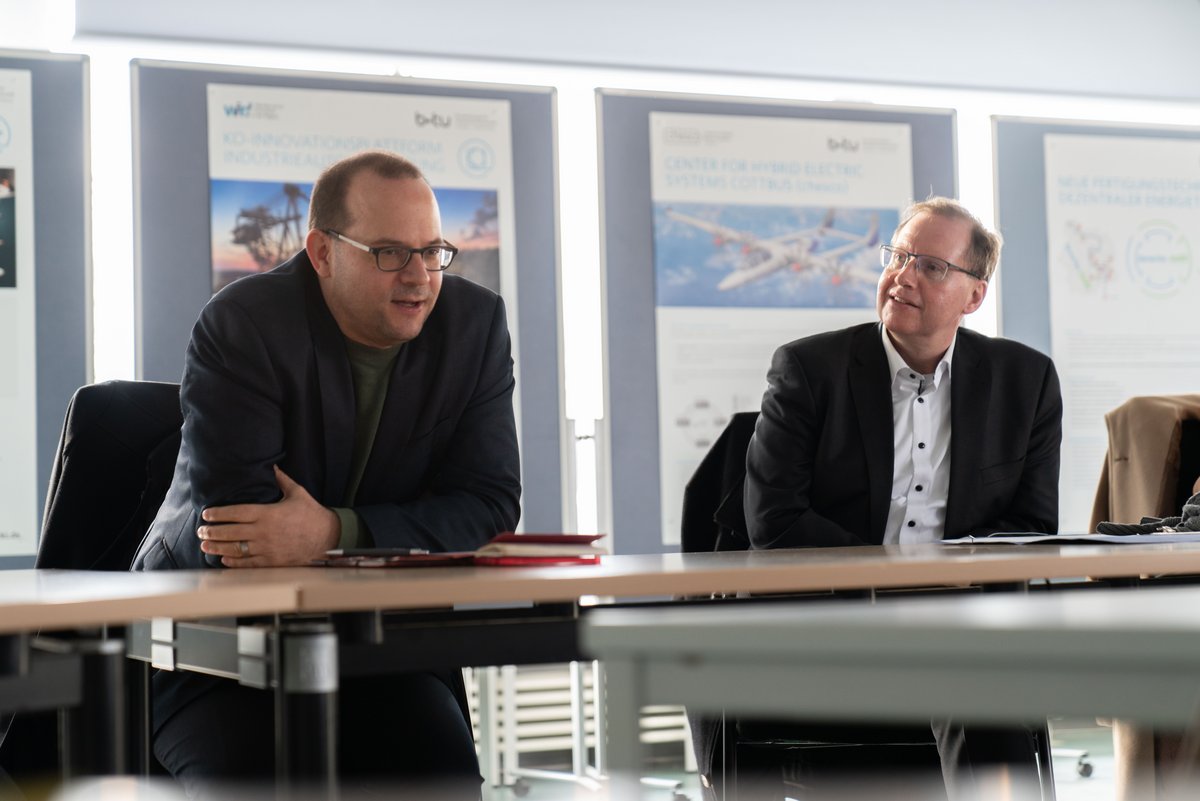AI - a future topic with many facets
In discussions, laboratory tours and lectures, researchers, lecturers and students of the BTU presented current projects and developments in the field of artificial intelligence. Stations on the tour, during which State Secretary of Science Tobias Dünow informed himself at the BTU, were the Lusatian Center for Artificial Intelligence (LZKI), the Competence Center SME 4.0, the Innovation Campus Electronics and Microsensors (iCampus Cottbus), the Energy Innovation Center (EIZ), the Cognitive Material Diagnostics of Fraunhofer IKTS and the startup ePHANT as well as the AI teaching laboratory of the new AI degree programs and the BTU-wide project to anchor AI topics in teaching - KI@MINT. During his visit, Tobias Dünow was accompanied by Prof. Michael Hübner, full-time Vice President for Research and Transfer at BTU, and Prof. Peer Schmidt, Vice President for Studies and Teaching.
State Secretary for Science Tobias Dünow: "Artificial intelligence will profoundly change science, business and administration in many areas. That's why it's good news that AI is already playing such a major role in research and teaching at the BTU. The Lusatian Center for Artificial Intelligence will bundle competencies even more and establish new networks. This is a great opportunity not only for the BTU, but for the entire region."
Prof. Dr.-Ing. Michael Hübner welcomes the state strategy on artificial intelligence and says, "AI is a topic that involves almost all areas of our society and will have a decisive impact in the not-too-distant future. As a cross-cutting topic, it is of great importance, whether in research, development or studies. At BTU, artificial intelligence is therefore one of our university's strategic profile lines, together with sensor technology. More. AI has links to all of our other profile lines, such as energy transition and decarbonization, global change and transformation processes, and health and life sciences. It is reflected in research, transfer and studies."
"In order to adequately prepare the future generation for these challenges," adds Prof. Dr. Peer Schmidt, Vice President for Studies and Teaching at BTU, "we have launched four AI degree programs in the current winter semester. The new offerings provide students with a practical approach to artificial intelligence methods and ensure the qualification of young academic talent."
A strong network - Lusatian Center for Art ificial Intelligence The Lusatian Center for Artificial Intelligence (LZKI) is an initiative of BTU Cottbus-Senftenberg to support the structural change process in Lusatia. The LZKI has a broad national and international network of research and application partners beyond South Brandenburg. The LZKI is an integral part of the Lusatia Science Park and cooperates closely with its structural change initiatives and partners.
Digital competence for small and medium-sized enterprises The Mittelstand 4.0 Competence Center Cottbus supports small and medium-sized enterprises in Brandenburg in facing the challenges of the increasing change in the world of work and the resulting and necessary qualification measures. The offerings include the topics of Work 4.0, digitalization in logistics and production, IT security, assistance systems, automation technology, robotics, and social partnerships. The Cottbus Competence Center is part of the "Mittelstand 4.0" funding initiative, which is supported by the German Federal Ministry of Economics and Climate Protection (BMWi) as part of the "Mittelstand-Digital - Strategie zur digitalen Transformation der Unternehmensprozesse" funding priority.
Specific sensor technology for Lusatia In spring 2022, the second funding phase of the Electronics and Microsensor Technology Innovation Campus - iCampus - was launched. The iCampushas the goal of advancing the transformation of the Lusatian economy. Sensors form the interface between physical reality and digital processes. They are increasingly used in the medical, environmental and industrial sectors when it comes to monitoring processes. Information such as pH values, pressure, temperature or speeds can be detected in this way The iCampus is particularly geared towards cooperations with small and medium-sized companies. The Federal Ministry of Education and Research (BMBF) is funding the second phase from 2022 to 2026 with up to 20 million euros from the Structural Strengthening Act. The iCampus is supported by a total of six partners, including two Fraunhofer and Leibniz institutes each, the BTU and Thiem-Research GmbH.
As a bridge between science andindustry, more than 70 scientists from the BTU Cottbus-Senftenberg are developing innovative solutions and technologies for a climate-neutral energy supply in Lusatia and worldwide in the new Energy Innovation Center (EIZ) together with an interdisciplinary partner network. The EIZ consists of six networked laboratories (labs) with their own thematic focuses: Control Systems and Cyber Security, Energy Economics, Energy Storage and Conversion, High Power Grid Converter, Electric Power Systems and Scientific Computing. The German Federal Ministry of Education and Research is funding the EIZ in an initial phase over a period of four years with around 25.5 million euros. At the same time, the new laboratory infrastructure is being funded by the Investitions- und Landesbank des Landes Brandenburg (ILB) to the tune of a further 18.5 million euros. Over a period of ten years, the further development of the EIZ into a high-performance and innovative network is to be financed with a total of up to 102 million euros. ePHANT - from start-up idea to sustainable business model The four-member interdisciplinary founding team ePHANT is bringing intelligent charging management for electric vehicles into private households. The ePHANT Smart Charging System reduces electricity costs for electric vehicle users in the home and offers market players the flexibility they need to successfully shape the energy and mobility transition. The expertise of ePHANT GmbH i.G. lies in innovative business models in the power supply of electric vehicles, the grid-serving integration of charging processes and local load management.
AI-related degree programs and practical teaching formats at BTU Two bachelor's degree programs "Artificial Intelligence" and "Artificial Intelligence Technology" as well as two master's degree programs "Artificial Intelligence" (international) and "Artificial Intelligence Technology" started in the winter semester 2022/23. In particular, the international master's program "Artificial Intelligence" is in high demand. The study programs on AI technology are among the first of their kind in Germany and are trend-setting. In addition, the BTU offers a post-graduate program in "Cognitive and Dependable Systems". With funding from the BMBF's "Artificial Intelligence in Higher Education" program, the BTU has established practical AI teaching and learning formats worth two million euros as part of the KI@MINT project.
Within the framework of the state strategy for artificial intelligence , overarching approaches are to be developed, for example for data and computing infrastructures, for education and training, and for AI research, transfer and spin-offs. In particular, the focus areas of Economy and Work 4.0, Climate-Environment-Agriculture-Bioeconomy, Energy, Mobility, Logistics & Tourism, Health & Care and Administration are to play a central role. The AI strategy is being developed by an interministerial working group with the participation of numerous AI experts and stakeholders. A key points paper is expected to be available in the first half of 2023, and the complete state strategy by the beginning of 2024. Brandenburg AI Days were held for the first time at the beginning of December 2022 with representatives from municipalities and from science and research. Those interested in AI and AI researchers were able to network there and strategically discuss, among other things, opportunities and challenges, fields of application and transfer of artificial intelligence. The Digital AI Atlas was also presented at the conference. This lists ongoing AI projects and activities from research, teaching and transfer in the state at https://ai-science-atlas.innohub13.de/.
Contact
Kommunikationstechnik
T +49 (0) 355 69-2128
Matthias.Wolff(at)b-tu.de
Stabsstelle Kommunikation und Marketing
T +49 (0) 355 69-3126
susett.tanneberger(at)b-tu.de




